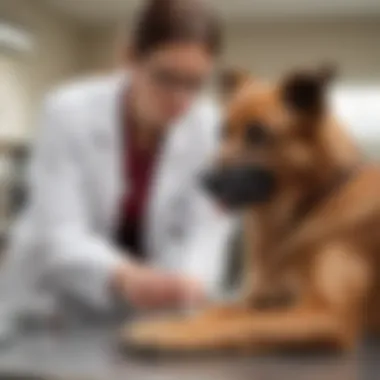Effective Remedies for Dog Diarrhea and Upset Stomach


Intro
Diarrhea and upset stomach are common issues that may affect dogs at any stage of their life. Many factors contribute to these uncomfortable symptoms, ranging from dietary changes to infections. Understanding the underlying causes can help pet owners identify appropriate remedies, both immediate and preventative.
This section delves into various aspects of dog care that play a significant role in maintaining gastrointestinal health. Addressing the needs of the individual dog is essential in providing the best care. Owners will find insights into their pets’ specific requirements, thus allowing for informed choices regarding their health and diet.
Understanding Your Pet
To properly address issues such as diarrhea and upset stomach, one must first understand the unique traits of their dog. Each breed comes with its own set of traits that can influence their health and well-being.
Breed Traits
Certain breeds are more prone to digestive problems than others. For example, Boxers and German Shepherds often have sensitive stomachs. Recognizing these predispositions allows pet owners to monitor their dogs closely and adapt their diets accordingly.
Common Temperaments
A dog’s temperament can also impact its health. Nervous or anxious dogs may experience gastrointestinal disturbances as a response to stress. On the other hand, breeds known for their calm nature may have fewer issues. Understanding the pet’s behavior can help owners create a more suitable environment.
Special Needs
Some dogs have special dietary requirements due to medical conditions. For instance, dogs with pancreatitis may need low-fat diets. Acknowledging these needs ensures that the pet's meals are tailored to prevent episodes of diarrhea.
Pet Care Essentials
Several key aspects of pet care contribute to preventing and managing digestive issues. By focusing on nutrition, grooming, and overall wellness, owners can create a strong foundation for their dogs’ health.
Nutrition and Feeding Guidelines
A balanced diet is crucial for maintaining gastrointestinal health. It is important to avoid sudden dietary changes that can upset a dog's stomach. Gradual adjustments to food, using high-quality dog food, and introducing fiber can help stabilize digestive issues. Including probiotics may also offer benefits for gut health.
Grooming Tips and Techniques
While grooming doesn’t directly affect gastrointestinal health, regular grooming helps maintain overall health. Ensuring that a dog is clean and free from parasites can prevent additional complications, as some infections can lead to diarrhea.
Health and Wellness
Routine veterinary check-ups play a crucial role in ensuring a dog’s health. Regular vaccinations and timely treatment of illnesses can help prevent conditions that may lead to diarrhea or an upset stomach. Owners should stay informed about potential health risks specific to their dog's breed.
“Routine veterinary care is essential for the overall well-being of your pet.”
Training and Behavior
Proper training can help address behavioral issues that may contribute to stress-related gastrointestinal problems. Understanding how behavior impacts a dog's health is vital in promoting good habits.
Basic Training Techniques
Basic training aids in establishing a structured environment. Commands such as “sit” and “stay” can make handling dogs easier, thereby reducing anxiety during unfamiliar situations.
Behavioral Problems and Solutions
Addressing behavioral issues, such as separation anxiety, can impact a dog’s digestive health. Strategies like crate training or gradual desensitization may help alleviate stress and protect against digestive distress.
Mental Stimulation Activities
Engaging dogs in mental activities helps reduce stress. Puzzles and interactive toys can promote a calmer state, which may benefit their gastrointestinal health.


Engaging with Your Pet
Positive interactions between pets and their owners enrich their lives while contributing to their well-being. This includes physical activity and socialization, both of which are key in maintaining digestive health.
Interactive Games and Toys
Interactive games can provide much-needed stimulation, helping to burn off excess energy. Providing toys that challenge and engage dogs can promote overall health.
Safe Outdoor Activities
Regular outdoor exercise promotes physical health and mental well-being. Activities like fetching or walking enhance a dog’s quality of life and can mitigate stress-induced gastrointestinal issues.
Family-Friendly Pet Interactions
Encouraging family members to participate in pet care creates a supportive environment for dogs. Joint activities can lead to better socialization and help reduce anxiety levels.
Pet Adoption and Integration
Welcoming a new dog into the home requires careful thought and preparation. This transition significantly impacts the new pet's health and behavior, especially regarding potential digestive issues.
Choosing the Right Pet for Your Lifestyle
Before adopting a dog, individuals should consider their lifestyle and household environment. Selecting a breed that matches one's lifestyle can reduce stress and health issues, including gastrointestinal problems.
Preparing Your Home for a New Pet
Preparing the house by dog-proofing areas and ensuring clean water and quality food are available is crucial as soon as a dog arrives. A stress-free environment promotes a healthy digestive system.
Tips for Smooth Prolusion
Integrating a new dog into the family requires patience. Gradual introductions to family members and other pets can ease the transition stress, potentially limiting upset stomach or diarrhea.
By considering these various aspects of dog care, owners can empower themselves with knowledge that leads to healthier and happier pets. Understanding the unique needs of dogs is essential for effective management of diarrhea and upset stomach, ultimately creating a better life for both the pet and owner.
Preface to Dog Gastrointestinal Issues
Gastrointestinal issues in dogs are common yet often overlooked. Understanding these concerns can enhance the well-being of our pets. Diarrhea and upset stomachs are typical problems that many dog owners encounter. Grasping their causes and remedies is paramount for prompt recovery. Abnormalities in a dog's digestive system can lead to discomfort. Recognizing these signs early can help avoid complications.
Defining Diarrhea in Dogs
Diarrhea in dogs is characterized by loose or watery stools. This condition can occur suddenly or develop over time. It can be acute or chronic based on its duration. Acute diarrhea lasts up to a few days. Chronic diarrhea, conversely, persists for several weeks or longer. There are multiple factors contributing to diarrhea. Changes in diet, infections, and stress can all play a role. Observing the dog’s behavior and stool consistency is critical for understanding the severity of the issue.
Understanding Upset Stomach Symptoms
An upset stomach in dogs may present several symptoms. Common signs include vomiting, nausea, and changes in appetite. A dog may show lethargy or become unusually restless. They might also exhibit signs such as excessive drooling or attempts to eat grass. These symptoms often indicate unsettled gastrointestinal function. Monitoring a pet’s health is crucial for determining the appropriate course of action. If these signs persist, seeking veterinary assistance is recommended.
Common Causes of Diarrhea and Upset Stomach
Understanding the common causes of diarrhea and upset stomach in dogs is essential for pet owners. By recognizing these underlying issues, owners can more effectively manage and prevent gastrointestinal disturbances. The proper identification of causes allows for timely interventions, which can be critical for a dog's overall health. Here, we explore various factors that can contribute to these conditions.
Dietary Indiscretion
Dietary indiscretion is a significant contributor to gastrointestinal distress in dogs. This term refers to when dogs eat something that disagrees with their stomachs. Common examples include scavenging from garbage, eating rich human food, or consuming foreign objects. Even some seemingly harmless foods, like chocolate, grapes, or certain nuts, can lead to severe health issues.
Owners should closely monitor what their dogs eat and consider establishing a consistent feeding routine with high-quality dog food. It is imperative to be aware that sudden dietary changes can also upset a dog's stomach, leading to diarrhea or vomiting. Starting any new diet gradually offers time for the dog’s digestive system to adjust, minimizing potential problems.
Infections and Parasites


Infections and parasites are another class of common culprits behind diarrhea and stomach upset in dogs. Bacterial infections from contaminated food or water can cause inflammation of the gastrointestinal tract, resulting in diarrhea. Furthermore, parasites such as roundworms, hookworms, and giardia are also frequent offenders, particularly in puppies and dogs with compromised immune systems.
Regular veterinary check-ups can help diagnose these issues. Annual fecal examinations can identify the presence of parasites, allowing for effective treatment before they lead to severe gastrointestinal issues. Pet owners should also keep an eye out for any sudden changes in their dog's stool or behavior, as these can be indicators of more serious infections.
Food Allergies
Food allergies can manifest as gastrointestinal upset in dogs and are often overlooked. These allergies occur when a dog’s immune system reacts adversely to specific ingredients in their diet. Common allergens typically include beef, dairy, chicken, and wheat. Symptoms may range from mild diarrhea to severe vomiting and discomfort.
Identifying and eliminating offending ingredients from a dog’s diet can be challenging. An elimination diet, conducted under veterinary guidance, is the best approach to isolate ingredients causing the allergy. Once identified, selecting dog food that does not contain these allergens is vital for maintaining digestive health.
Stress Factors
Stress factors can also lead to diarrhea and upset stomach in dogs. Just like humans, dogs experience stress and anxiety, which can adversely affect their gastrointestinal systems. Situations such as moving to a new home, introducing new pets, or changes in daily routine can trigger these issues.
Recognizing a dog’s stress triggers is crucial for mitigation. Creating a calm environment and providing plenty of reassurance can help reduce anxiety levels in dogs. Sometimes, behavioral training or calming supplements may be helpful as well. It is essential to understand that the mental well-being of a dog directly correlates with their physical health, particularly in gastrointestinal matters.
Understanding the common causes of diarrhea and upset stomach in dogs can enhance a pet owner's approach to preventive care and quick interventions.
Overall, being aware of these common causes equips pet owners with the knowledge needed to make better decisions, leading to healthier and happier dogs.
Immediate Remedies for Diarrhea and Upset Stomach
When dogs experience gastrointestinal discomfort, taking swift action is often necessary. Immediate remedies can alleviate symptoms and support overall recovery. Understanding the various methods available helps pet owners choose the most effective approach for their canine companions. This section focuses on practical solutions to address the immediate needs of dogs dealing with diarrhea and an upset stomach. The aim is to provide pet owners with actionable information that prioritizes the health and comfort of their pets.
Fasting: When and How
Fasting can be an essential initial step in managing diarrhea and upset stomach in dogs. By skipping meals for a short period, usually 12 to 24 hours, the digestive system gets a chance to rest. It allows any inflammation or irritation to subside. However, this should be approached with caution. Small puppies or dogs with existing health conditions should not be fasted without consulting their veterinarian. During this fasting period, it is critical to offer clean water to ensure hydration, as hydration remains vital for all dogs, irrespective of their health conditions. After the fasting period, reintroducing food should be gradual, starting with bland options.
Bland Diet Recommendations
Plain Boiled Rice
Plain boiled rice is a widely accepted recommendation for dogs facing digestive upset. The key characteristic of plain boiled rice is its ease of digestion. Dogs can handle this carbohydrate-rich grain without straining their sensitive stomachs. The texture of the rice provides bulk to stool, effectively addressing diarrhea. Its bland nature means it won't irritate the digestive tract further. However, it's essential to ensure no added salt or seasoning is included while preparing rice. One downside is that plain rice lacks essential nutrients, which is why it should only be given for a limited time.
Boiled Chicken Without Skin
Boiled chicken without skin is another preferred bland diet option for dogs with upset stomachs. This choice has a key characteristic of being high in protein and low in fat. It is gentle on the stomach, making it easier for dogs to digest. The lack of skin minimizes fat content, further reducing the risk of gastrointestinal irritation. Dogs often find boiled chicken palatable, which encourages them to eat after a period of fasting. Nonetheless, this option alone lacks comprehensive nutrition, so it should be paired with other food items once the dog's condition improves.
Pumpkin Puree
Pumpkin puree is a beneficial ingredient often recommended for dogs with diarrhea or constipation. The natural fiber in pumpkin aids in stool regulation. This key characteristic makes it a unique addition to a bland diet. Dogs can benefit from its easily digestible nature, which provides nutrients while being gentle on the stomach. It's crucial to choose pure canned pumpkin, avoiding any added sugars and spices often found in pumpkin pie filling. However, too much pumpkin can lead to loose stools, so moderation is essential when introducing it.
Hydration Is Key
Proper hydration is vital when dealing with diarrhea and upset stomach in dogs. Loose stools can quickly lead to dehydration, which may complicate an already delicate situation. Keeping fresh, clean water available at all times encourages dogs to drink. In some cases, adding electrolyte solutions designed for pets may help replenish lost minerals. Monitoring the dog's water intake and overall behavior is crucial, as lethargy can signal serious dehydration, requiring prompt veterinary attention.
Probiotics and Their Benefits
Probiotics are beneficial microorganisms that support digestion and overall gut health. These can be particularly helpful for dogs recovering from gastrointestinal issues. Administering probiotics may restore the natural balance of gut bacteria, leading to improved digestion. Furthermore, some studies suggest that probiotics can aid in preventing future digestive upsets. It's advisable to consult with a veterinarian before introducing supplements to a dog's diet, ensuring the selected product is appropriate for their specific needs. The availability of probiotics in various forms, including powders and treats, makes incorporation into a dog's regimen convenient and effective.
Remember: The health and well-being of your dog are top priorities. Choosing immediate remedies wisely can significantly impact their recovery and comfort. Monitor your dog's condition closely and don’t hesitate to seek advice from a veterinarian if symptoms persist.
When to Consult a Veterinarian
Recognizing when to seek veterinary advice is crucial for addressing diarrhea and upset stomach in dogs. Pet owners may instinctively turn to home remedies or dietary adjustments, but some conditions necessitate professional intervention. Understanding when to consult a veterinarian ensures that your dog receives the appropriate care timely. Veterinary expertise can not only alleviate discomfort but also prevent potential complications. This section delineates specific signs indicating the need for immediate veterinary consultation, as well as the treatment options available for serious gastrointestinal issues.
Signs That Require Immediate Attention
Some symptoms may indicate a serious condition that requires prompt veterinary attention. Here are key signs you should not ignore:
- Persistent Diarrhea: If your dog has diarrhea lasting more than 24 hours, it is time to call the vet.
- Blood in Stool: The presence of blood suggests a more severe underlying issue.
- Vomiting: Repeated vomiting accompanying diarrhea can signify a serious health concern.
- Lethargy: Unusual tiredness or lack of activity may indicate illness.
- Signs of Dehydration: Dry gums, excessive thirst, or loss of skin elasticity are clear indications of dehydration.
- Abdominal Pain: If your dog is exhibiting signs of discomfort or pain in the abdomen, this is a cause for concern.


Recognizing these indicators facilitates early interventions, thereby increasing the odds for a better recovery and outcome.
Veterinary Treatments for Severe Cases
In cases where a dog requires veterinary assistance, there are specific treatments that vets may utilize. Two common treatments are medications and diagnostic testing.
Medications
Medications prescribed by veterinarians can have a significant impact on treating severe gastrointestinal issues in dogs. These medications may include anti-diarrheals, antibiotics, or other targeted treatments. The key characteristic of medications is their ability to directly combat the cause of symptoms, such as bacterial infections or inflammation. Many veterinary medications are tailored to specific conditions, making them a pivotal choice for effective treatment.
Unique features of these medications can vary; some focus on stopping diarrhea while others may improve gastrointestinal flora. The advantages of using medications include quicker symptom relief and deeper intervention against underlying causes. However, one should remain cautious, as certain medications might not be suitable for all dogs, especially those with specific health conditions.
Diagnostic Testing
Diagnostic testing provides insights into the underlying causes of diarrhea and upsets stomach. Tests may include fecal exams, blood tests, or imaging studies. The key characteristic of diagnostic testing is its ability to provide a detailed understanding of health issues.
This option can be a beneficial choice when symptoms are ambiguous or when there is a longer-term pattern of health issues. Through diagnostic testing, veterinarians can identify serious conditions such as infections, organ dysfunctions, or other diseases. This unique feature paves the way for targeted treatments, ensuring that the care your dog receives is properly aligned with their specific needs. While diagnostic testing can incur costs and may require time for results, its long-term advantages often outweigh these concerns, allowing for informed decisions regarding your dog's health.
Understanding when to consult a veterinarian and the potential treatments available is essential for your dog's health. Prompt attention can prevent minor issues from developing into significant problems.
Preventive Measures for Future Incidents
Preventive measures play a crucial role in ensuring the ongoing gastrointestinal health of dogs. By taking a proactive stance, pet owners can minimize the risk of diarrhea and upset stomach, resulting in a healthier and happier pet. Understanding the importance of prevention is essential in addressing these health issues effectively.
Establishing a Balanced Diet
A balanced diet serves as the foundation for good health in dogs. It is vital for pet owners to understand the nutritional needs of their canine companions. Nutrients such as proteins, fats, carbohydrates, vitamins, and minerals are all essential. Introducing high-quality commercial dog food that meets appropriate standards can significantly reduce gastrointestinal issues.
- Look for food with identifiable meat sources (like chicken or beef) as the primary ingredient.
- Avoid foods that contain fillers or artificial additives, which can irritate the digestive system.
- Gradually introduce any dietary changes, mixing the old and new food to prevent digestive upset.
Regular Vet Check-ups
Regular veterinary check-ups are an integral part of preventive care. Routine visits help in monitoring a dog's health and catching potential issues early. During these check-ups, veterinarians can provide vaccinations, dental care, and essential screenings. Pet owners are encouraged to discuss any observed changes in behavior or digestion with their vet.
- Ensure vaccines for communicable diseases are up to date.
- Ask the vet about parasite control to prevent infections that can cause gastrointestinal distress.
- Regularly scheduled wellness visits can save money in the long run by preventing serious health problems.
Managing Stress Levels
Stress can have a significant impact on a dog’s stomach health. Canine anxiety can cause or exacerbate gastrointestinal issues. Pet owners should take steps to identify and mitigate stress triggers.
- Create a stable daily routine for feeding and exercise.
- Provide a peaceful environment free from loud noises or disruptions.
- Consider training sessions or interaction that engages their mind and reduces anxiety.
“Staying mindful of factors that induce stress is key for maintaining digestive health.”
By implementing these preventive measures, pet owners can help ensure their dogs maintain good digestive health for the long term. The insights gained from understanding diet, regular veterinary care, and the management of stress are vital components of a comprehensive approach to preventing diarrhea and upset stomach in dogs.
Culmination
A well-informed pet owner is equipped to handle these common health concerns efficiently. Emphasizing the importance of proper hydration, dietary adjustments, and when to consult a veterinarian is crucial in managing these conditions effectively.
Summary of Key Points
- Immediate Remedies: Fasting, bland diets, and hydration play essential roles in addressing diarrhea and upset stomach.
- Veterinary Consultations: Knowing the signs that necessitate veterinary consultation can help avert more serious health issues.
- Preventive Measures: A balanced diet, regular vet check-ups, and managing stress can reduce the risk of these gastrointestinal issues in the future.
By synthesizing these key points, pet owners can develop a holistic approach to their dog’s gastrointestinal health. Understanding when and how to act can provide peace of mind during troubling times.
Final Thoughts on Canine Gastrointestinal Health
Canine gastrointestinal health is vital for the overall quality of life. Pet owners should remain vigilant regarding potential symptoms and issues that could arise. Investing time in learning about effective remedies and preventive measures can lead to healthier and happier lives for dogs.
Ultimately, promoting good gastrointestinal health fosters a deeper bond between pets and their owners. Implementing the remedies discussed throughout this article ensures that pet owners can react promptly and appropriately to any gastrointestinal distress. This proactive approach not only addresses immediate health concerns but also supports a long-term commitment to ensuring their pets thrive.
It's essential to recognize the role of diet, hydration, and stress management in canine health. With careful attention, many issues can be mitigated before they escalate.



